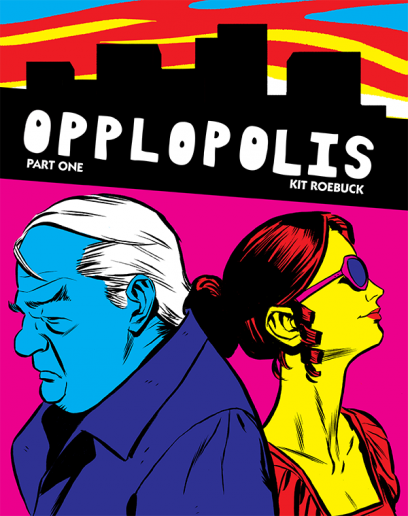Kit Roebuck's work first came to my attention with Nine Planets Without Intelligent Life, a webcomic that took advantage of the online format and used creative layouts to heighten the sense of loneliness and isolation.
The saga followed two robots traveling around the solar system, having existential crises and zen-like moments as they savored the different cultures of each planet. The ending, however, provided little in the way of resolution beyond the quest for answers. That isn't criticism: By the time the two robots end up on Pluto, you start to feel as if it couldn't have ended any other way. Much like life, it's the journey that matters.
I get a similar feeling when reading Roebuck's latest work, Opplopolis. While the comic has been available online, with an option to download a copy onto Kindle, Roebuck has recently collected the first 10 issues of his webcomic in a print edition that can be purchased on Amazon. From Roebuck's press release: "Released online in two-page installments since late 2012, Opplopolis has grown to thirteen chapters of a planned twenty, the first ten of which have now been collected into a single, 278-page printed volume."
The comic takes place in a city that appears to be displaced in time: It's ruled by nobility that dresses like 18th-century aristocracy, but people log onto the Internet using computers that look as if they came out of the early 2000s -- except for the pipes and tubes sticking out of them. Kids discover secrets on VHS while spies drive around in classic roadsters straight out of the 1940s. And there's a somewhat-futuristic pop star who shares her identity with several other starlets, like a celebrity hive mind.
At one point in the story, a liberal professor neatly sums up the creeping feeling of displacement, suggesting to his class that progressiveness only benefits the wealthy who can afford to keep up with advances in technology, leaving the majority to be stuck in the past. "We will need a new epistemology of time," he says. "In the new epistemology, everything will happen at once." Perhaps he's unaware his theory is reality.
The comic seems like something Vertigo might've published in the 1990s. Opplopolis features a high-concept world in which the narrative is keenly focused on the less-flashy personal lives of its protagonists ... which, in turn, actually becomes more fascinating than the world around them. I'm skirting sacrilege when I say that Roebuck's illustrative style reminds me a lot of Dave Gibbons' work. The deceptively conventional layouts and bold colors pack power in subtlety. There's a scene in which a lady dressed like Marie Antoinette is chatting with a spy, and their conversation is interrupted by clowns springing an early birthday party. Weird, right? And yet, the most off-kilter thing about the sequence is that the woman may be laughing a little too forcefully. There's a difference between your garden-variety weirdness and the downright disturbing. The more inexplicable, the more unsettling.
There's a mystery, too, centering around something called "Marvedyne" that draws characters from different walks of life to solve what it means. It seems it's the word itself that causes them to spring into action, a trigger that acts like a post-hypnotic suggestion in which all pursuers are acting out of free will. What is "Marvedyne"? Why are powerful people trying to hide it? The further people try to follow the tantalizing threads, the more it threatens to destroy their lives. Maybe they're threatened by strange gunmen. Maybe they enter a world that exists beyond physics.
The more I read Opplopolis, however, the more I'm convinced it doesn't really matter what the nature of "Marvedyne" is. As with Nine Planets Without Intelligent Life, it's the journey that's rewarding. I know it sounds like a cop-out, especially considering some high-profile mystery shows have hand-waved their disappointing resolutions with the same explanation. It's true here, though. It's a thought-provoking comic full of engrossing stories and interesting characters.


